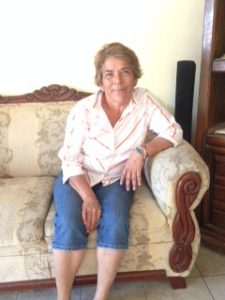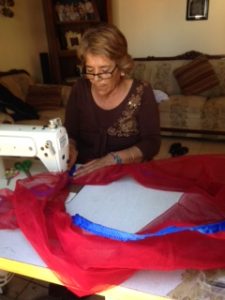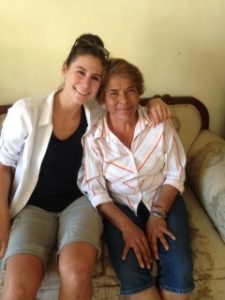
En español (an English translation can be found below):
Mientras todos los otros estudiantes han ido juntos para viajar y aprender en las aventuras descritas en este sitio de blog, yo he estado haciendo un “homestay”, viviendo en la casa de Eva Graciela Amaya Rodríguez. Doña Eva es una mujer compradora de pescado aquí en el pueblo pescadero de Kino en Sonora, México. Cuando termine con este homestay, me habré quedado en la casa de Doña Eva y su familia por dos semanas, siguiéndolos en casi todo lo que hacen diariamente (de hecho, Doña Eva me ha llamado a “su sombra”). Para este blog, le pregunté a Doña Eva si a ella le gustaría hacer una entrevista para compartir con el mundo como es ser una mujer compradora de pescado. La entrevista está abajo; por esto, atribuyo la mayoría de la paternidad literaria de este blog a ella. Si Ud. encuentra errores con mi español en este blog, le pido su perdón, y le invito avisarme en el parte de “comentarios” abajo.

Yo: ¿Me puede describir un día normal en la vida de Doña Eva?
Doña Eva: Me levanto a las seis de la mañana; tomo mi café; y espero los trabajadores para ir a Punta Chueca [el pueblo donde salen los pescadores a trabajar]. Los llevo a las compras de gasolina, de aceite, de guantes, de tienda, y nos vamos 40 kilómetros al lugar donde van a trabajar, y ya se quedan. Yo regreso a las 9:00, 10:00 de la mañana a mi casa; luego hago las labores del hogar. Si tengo que ir al banco a Calle 12 [la ciudad que tiene el banco más cercano], son 40 kilómetros; si tengo que ir al banco en Hermosillo, tengo que manejar 100 kilómetros de ida y 100 de venida. Por las 3:00 de la tarde, volvemos a ir a Punta Chueca a recibir el callo [una especie de marisco] de los trabajadores. Pesamos, pagamos, hacemos cuentas, nos recogemos, y luego volvemos otra vez para el pueblo. Si hay que venderlo aquí, pues lo vendemos aquí; y si no, tenemos que enviarlo afuera por lo que tenemos que enhielarlo, guardarlo para otro día, y envolverlo y empacarlo y mandarlo en autobús de la Calle 12 otra vez. Para esto, tenemos que traer la guía [las formas oficiales de la venta], la factura, y el arribo, y ir al Calle 12 a dejar empacado el callo en cajas de 50 kilos, 60 kilos cada caja. Y a las 8 de la noche regresamos a la casa, y a llegar a la casa a las 10 de la noche a descansar para el próximo día empezar de nuevo.
Yo: ¿Qué le gusta de este trabajo?
Doña Eva: Me gusta todo. A empezar, me gusta la convivencia con las personas, me gusta el jaloneo que tenemos de que si me pagas, no me pagas, que si vas a trabajar que no vas, que si fuiste: ese, como se puede decir, el ánimo. El convivir con ellos; bromear. Y me gusta también porque es un trabajo redituable, económicamente, me va bien.
Yo: ¿Y qué es difícil de este trabajo?
Doña Eva: El trato con las personas porque todos son hombres. Todos los con que yo trabajo son hombres, todos. Puros hombres.
Yo: ¿Hay muchas mujeres que hacen este trabajo?
Doña Eva: Aquí no.
Yo: ¿Qué son las dificultades de ser mujer en este empleo?
Doña Eva: Pues, porque ellos son hombres, todos son hombres, todos quieren hacer lo que ellos dicen. De hecho de que son hombres, creen que tienen la razón. Entonces yo no me dejo pues.
Yo: ¿Ud. se identifica como feminista? ¿Por qué sí o por qué no?
Doña Eva: Sí. Porque tenemos las mismas facultades, emocionales y físicas y todo para ser igual que un hombre, pues. Este trabajo lo han hecho hombres aquí en este pueblo por muchos años; pues yo siempre he sido mujer y estado adelante. Y al contrario he visto muchos hombres que han empezado a querer hacer este trabajo, y he visto que se van. Y he visto también algunas mujeres que han tratado, y no he visto alguna al día de hoy. Se retiran después de 2 meses, 3 meses, y ya no vuelven.
Yo: ¿Por fin, hay algo más que quiere decir a las mujeres del mundo, o dar algún consejo?
Doña Eva: Pues que se esfuercen por trabajar, por salir adelante, porque uno lo puede lograr sin necesidad de ser hombre o tener un hombre a tu lado que te va a apoyar.
Eva Graciela Amaya Rodríguez tiene 54 años y vive con su hijo, su nuera, sus dos nietos y su perro en Bahía de Kino, México. Ella es una de muy pocas mujeres que es compradora de pescado en esta área.

English version:
While the rest of the class has been traveling and learning together in adventures chronicled on this blog site, I have been doing a homestay with Eva Graciela Amaya Rodriguez, a woman fish buyer in the small fishing town of Kino in Sonora, Mexico. By the end of my time here, I will have been living with Doña Eva and her family for two weeks, following them for almost everything they do (Doña Eva calls me her “shadow”). For this blog, I asked her whether she would like to do an interview to share her experience as a small-scale fish buyer, and a woman, with the world. Thus I attribute most of the authorship of this blog post to her; I am transcribing the interview, but the words that follow are hers. For this version in English, I have translated the original interview (found above); please do not hesitate to comment on this blog if you find errors in translation, as my Spanish is still imperfect.
Yo: Can you tell me what a normal day looks like for Doña Eva?
Doña Eva: I wake up at 6 AM, have coffee, and wait for the fishers to arrive so that we can go to Punta Chueca [the nearby town where the fishers leave from]. I take them to buy gasoline, motor oil, and gloves, and we drive 40 km to the place where they work. I leave them there and return home around 9 or 10 AM, and take care of all the household chores. If I have to go to the bank in Calle 12 [the nearest city with a bank], I drive 40 km; if I have to go to the larger bank in Hermosillo, I have to drive 100 km there and 100 km back. At 3 PM, I return to Punta Chueca to receive the penshell [a large bivalve species] from the fishers. We weigh it, I pay them, we settle accounts, and I bring them back to my town. If I am going to sell the penshell here, then I sell it; if not, we have to send the product elsewhere, for which we have to package the product in ice and either save it for the next day or pack it and send it on a bus that leaves from Calle 12. To sell the penshell, we have to bring the paperwork [from the government office], pay tax, pay the fee to the bus driver who will transport the boxes, and go to Calle 12 to leave the penshell in boxes that each weigh 50-60 kg. At 8 PM, we leave Calle 12 and arrive home at 10 PM to rest for the next day to start anew.
Yo: What do you like about this work?
Doña Eva: I like everything. To start, I like the relationships and companionship with the people I work with. I also like the give-and-take that we have of whether you will pay me or not, whether you will work or not, if you are supposed to work whether you actually went out. I like the excitement of it, and the camaraderie, the joking. I also like this work because it is profitable, and economically, I am doing well.
Yo: What is the most difficult part of this work?
Doña Eva: Dealing with people is difficult because everybody I work with is male – every single one.
Yo: Do many women do the work you do?
Doña Eva: Not here.
Yo: Is there anything difficult about doing this work as a woman?
Doña Eva: Well, because everybody I work with is a man, they all want to do as they say; they think they are always right. Entonces yo no me dejo pues.
Yo: Do you identify as a feminist? Why or why not?
Doña Eva: Yes, because as women we have the same emotional and physical faculties to be equal to men. Men have done this work in this town for years, and I have always been a woman, and I have managed to come out on top. On the contrary, many men have wanted to do this work, and they have started it and I have seen them leave. I have also seen women try, and today I don’t see a single one. They all quit after 2 or 3 months and don’t come back.
Yo: Finally, is there anything else you would like to say to the women of the world, any advice you’d like to give?
Doña Eva: That they make a strong effort and work hard to come out on top, because you can succeed without needing to be a man or have a man at your side to support you.
Eva Graciela Amaya Rodriguez is 54 years old and lives with her son, daughter-in-law, two grandchildren, and dog in Bahía de Kino, Mexico. She is one of the few female fish buyers in this area.
